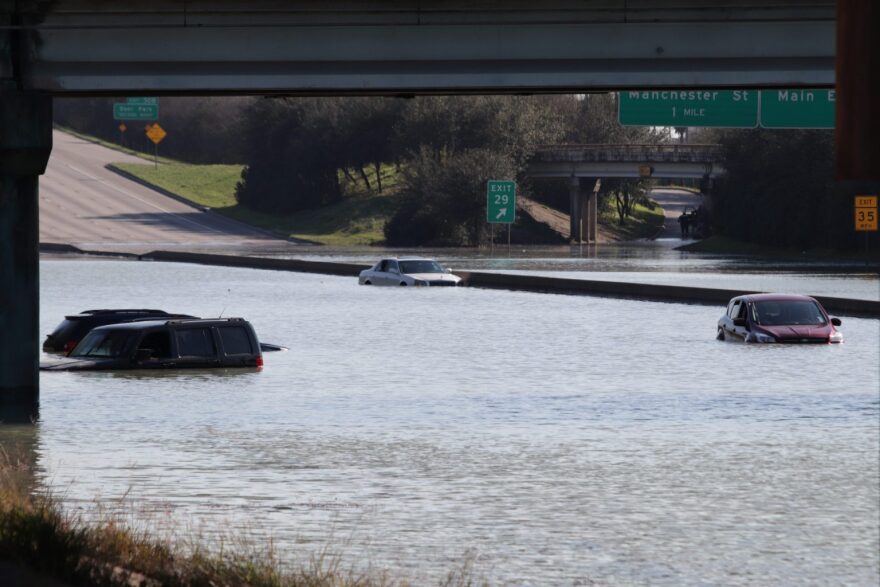A 96-inch water main burst in Houston Thursday. The result: Flooded streets, low water pressure, and water outages.
But even after the line was drained and water began to flow again as normal, most of Houston’s 2.3 million residents were still being advised Friday to boil all of their water before consuming it.
Why?
According to Dr. Sherri Onyiego of Harris County Public Health, it’s important to have an abundance of caution when it comes to potentially unsafe water. Onyiego told Houston Matters host Craig Cohen that contaminated water could lead to widespread gastrointestinal issues like nausea, vomiting and diarrhea, and even neurological symptoms like headaches.
“The boil water notice is an important order to really heed by, because a lot of the water that’s getting tested could potentially harbor dangerous viruses, bacteria, parasites, even chemicals, that could potentially hurt others,” Onyiego said.
Health officials recommend bringing water to a rolling boil for at least two minutes, and letting it cool before using. They also recommend using bottled water.
“Boiled or bottled water should be used for drinking, making ice, brushing teeth, washing dishes, food preparation, and water for pets,” according to a city fact sheet. “Boiling kills harmful bacteria and other organisms in the water that may cause illness. You should throw away ice made during the time the notice was issued (freezing does not kill bacteria).”
The city added only using boiled or bottled water for washing fruits and vegetables. In particular, the city stressed using bottled water for baby formula, or if there’s no bottled water available, to use water that has been rapidly boiled for at least three minutes.
For those washing dishes, the water is safe, but hot, soapy water should be used, and dishes should be rinsed in boiled water. Laundry and bathing are also safe.
Boil water advisories typically last 24-to-48 hours, but people should not stop boiling water until they receive notice from the city.
When the advisory is finally over, the city said to run all cold water faucets in your home for at least one minute to flush the system, and to clean automatic ice makers by making and discarding three batches of ice. Water softeners should run through a regeneration cycle, the city added.

It’s not just ordinary precaution that leads to a boil water notice. In cases like Thursday’s water main burst, once water pressure reaches below a certain threshold, regulations set by the Texas Commission for Environmental Quality kick in, and the boil water advisory is immediately put into effect, health officials said.
Initial sample results should come in Friday evening, but according to according to J. Michael Ereti, acting director of Houston Public Works, those samples are not from approved TCEQ sample areas. The city is now working with TCEQ to find approved sample areas, test the water, and hopefully life the advisory, Ereti told Houston Matters.
But, he added, that would take at least another day.
“Once the samples are taken it actually has to incubate in a lab setting for an extended period of time,” Ereti said. “That’s why you’re talking about the 24 hours, before we can actually sample it. You’ve got to culture the bacteria to see if there’s any contaminants.”
The city, state and county were set to provide updates throughout the day, he said.
The burst occurred during what Ereti called “very routine” work on the pipe, which was 10 feet below the ground. A backhoe was used to dig about four feet, but the rest of the work was done by hand.
Workers began investigating the pipe, beginning “exploratory work” on a leak, according to the city. That’s when the water main burst, Ereti said.
Crews and contractors worked through the night to fix the problem, taking hours to drain the pipe completely and isolating the broken line. The next steps are to begin repair, and find out what, exactly, led to the burst.
But Ereti said the main problem is aging infrastructure — in this case, a roughly 8-foot pipe that was 35 years old.
“That’s the nature of pipes,” he said. “When you have this kind of pressure on such a large pipe, these kind of things happen. And the first indication is always a leak, and sometimes the pressure builds up so much, and some failure can cause this kind of burst. It really is the condition of the pipe.”
Copyright Houston Public Media. To learn more, visit HoustonPublicMedia.org




